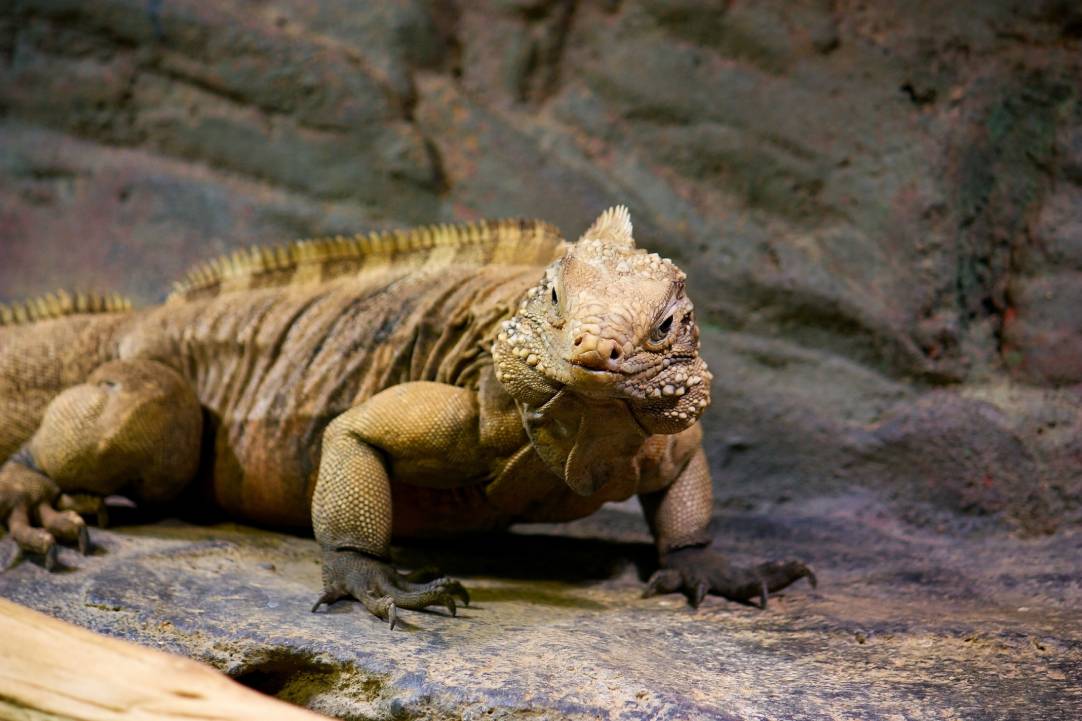Click to Skip Ahead
Iguanas are large lizards that can reach 5 feet in length and weigh up to 17 pounds. These reptiles have become common pets because they’re sold in pet stores and are easy to acquire. However, these are exotic reptiles and should only be kept by people experienced enough to care for them properly.
Since these creatures can grow so big, many people wonder if they’re dangerous. When you keep any animal as a pet, practices should be put in place to keep you and your pet safe, and this also applies to iguanas. They can be dangerous to humans but only in certain circumstances, such as if they are inadequately cared for or treated poorly.
The nature of the iguana depends on the individual. Some become quite tame when kept as pets, while others never fully warm up to people. Getting to know your iguana’s personality, body language, likes, and dislikes will help you ensure that they stay content and therefore, do not become dangerous. Respecting your iguana is a crucial factor.
That said, it’s impossible to guarantee that your iguana will never harm you or someone else. There is always a risk of it happening for as long as you own this reptile. Unprovoked bites are rare but they can happen.

Are Iguanas Venomous?
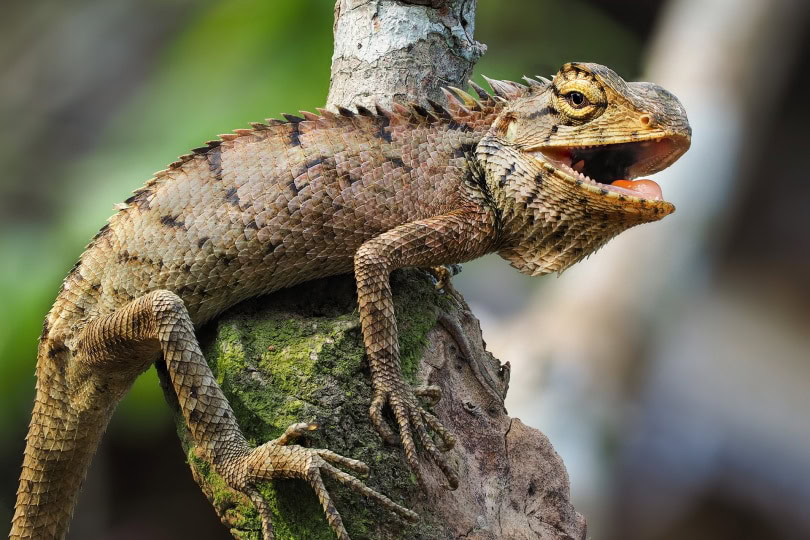
The first thing that comes to mind for many people when wondering if a reptile is dangerous is if they are venomous.
Iguanas are indeed venomous, but they are the least dangerous among the venomous lizards. They possess venom glands in their upper and lower jaws, and when they bite, venom is released into their victim. But it is weak and harmless to humans. Still, they can cause severe injury with a bite.
Do Iguanas Have Teeth?
Iguanas have four quadrants in their mouths, and each section can hold 20–30 teeth. This means an iguana can have anywhere from 80–120 teeth in their mouth at any time. These teeth are regularly shed and regrown, so the total number of teeth can always change for each lizard.
Their teeth are small, transparent, and serrated. They resemble the edge of a bread knife and can do damage to the skin of anything that the iguana bites, including humans. If an iguana bites you, they will likely break your skin.

How Bad Is an Iguana Bite?
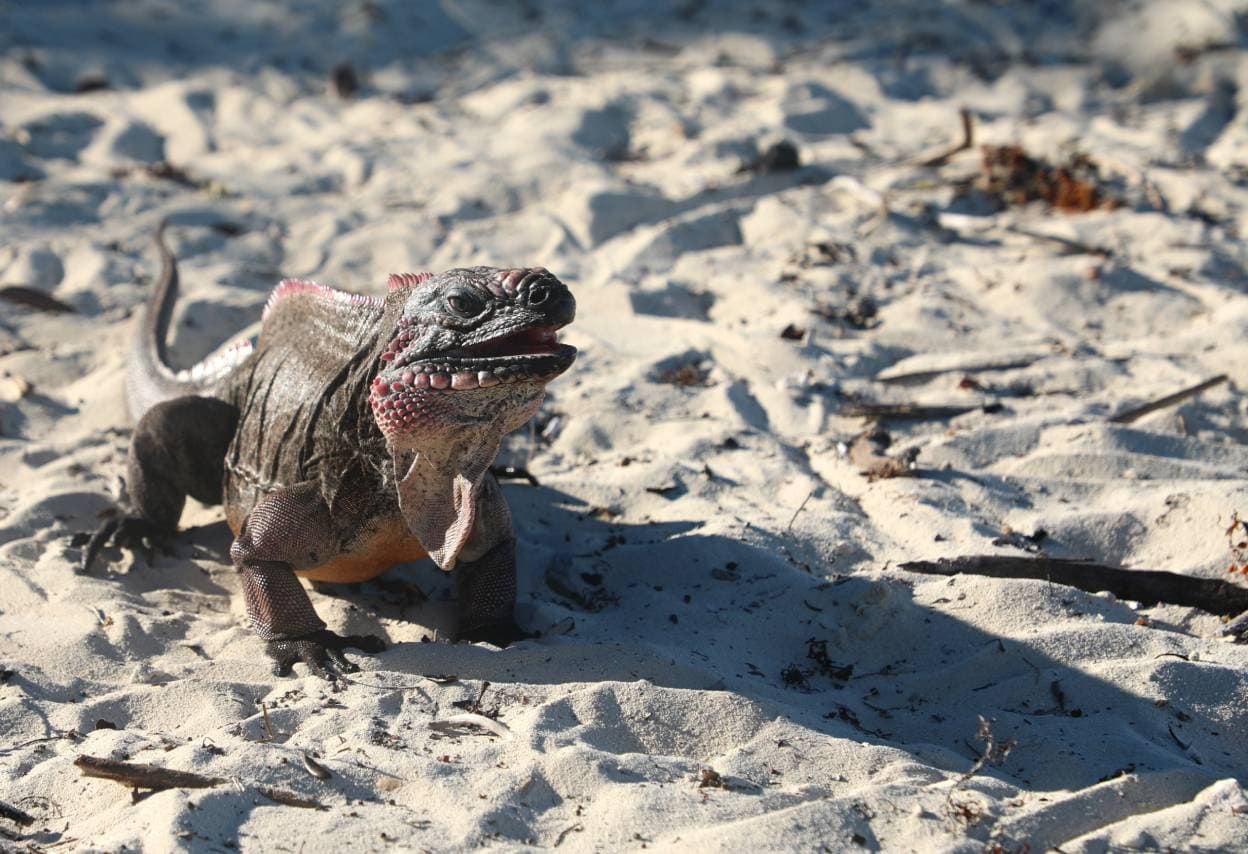
When considering how dangerous iguanas are, the pain of their bite should be noted. This lizard can attach themselves to your hand, finger, or wrist and not let go. If you struggle and try to pull your hand back, this can cause more damage. Ripping and tearing can occur, and the wound can become much worse. It’s possible that iguanas can bite down to the bone.
If your iguana releases you, they may immediately bite again. It’s not uncommon for iguanas to repeat biting if you aren’t quick enough to move out of the way.
If your iguana is latched onto you, the first thing that you have to do is get them to release their grip without trying to pull them off of you or pull your hand away. A cloth soaked in rubbing alcohol and waved in front of their face might make them release their hold. Ammonia may do the same thing. Keep these liquids on hand in case of a biting incident.
You can also try throwing a cloth over their heads to put them in darkness. When they’re in the dark, they may feel safe enough to release their hold. Holding the iguana upside down and pulling gently on their dewlap, the half-moon-shaped flap of skin on their throats, may disorient them enough to make them relax their grip.
Iguanas carry bacteria in their mouths, including Salmonella. Once you’re bitten, washing the wound with soap and water is necessary. Seek medical attention if the wound warrants it. Keep the area as clean as possible.
Iguanas can also carry Salmonella on their skin, so it’s important to wash your hands every time you are finished handling your reptile.

Are Iguanas Tame?
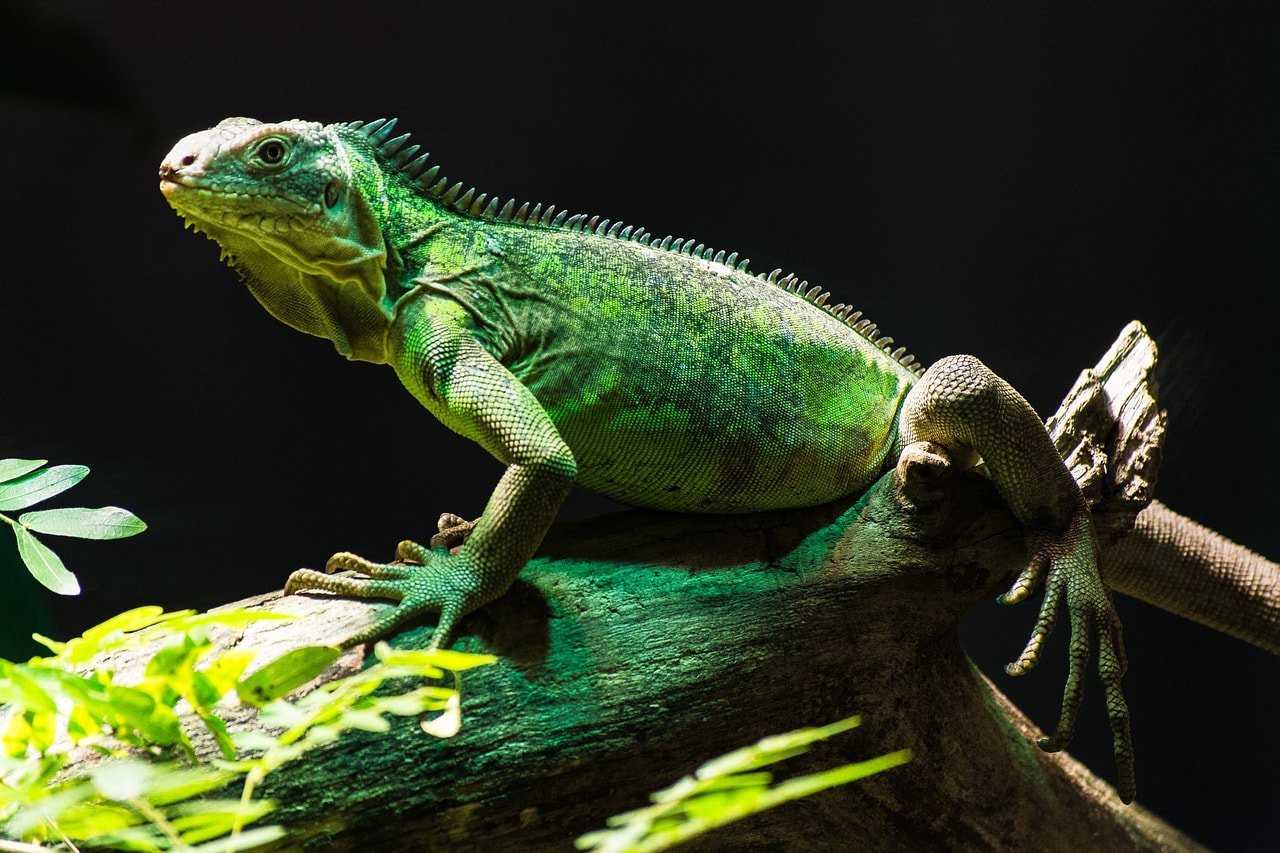
Even though you may own an iguana, this reptile is not tame the same way that a domesticated dog or cat is tame. Domesticated animals are born with a sense that humans are friends, and they can get along with us. Reptiles never truly become tame. They may be able to recognize us and know that we provide their food, but they don’t feel the urge to curl up with us on the couch.
No matter how friendly your iguana may seem, they are still wild animals. This is important to remember because it can be easy to trust that your docile, calm iguana will remain that way. When a wild animal feels threatened, instinct takes over. For iguanas, that means if they sense a threat from you, they will act on that and defend themselves, even if they’ve previously always been calm around you.
The first thing that an iguana will want to do when they feel like they are in danger is retreat. They would rather get away from the danger than fight it. But if avoiding this threat isn’t possible, they will become offensive rather than defensive. This is when the bite or attack will happen.
Warning Signs of Biting
This is where paying attention to your iguana’s body language can help you determine when they may become dangerous to you. If you notice any of these behaviors, leave your iguana alone and let them calm down.
- Standing on all fours in an attempt to make themselves appear larger
- Bobbing their head up and down, either quickly or slowly
- Hissing, which is a universal sign that they want you to back off
- Puffing up their body after breathing in deeply to look bigger
- Lowering their dewlap
While iguanas can bite without any warning signs, they rarely bite for no reason. Be mindful of their behaviors, and know that if one or several of these signs are displayed, your iguana is feeling agitated, scared, or angry. It’s best to leave them alone until the behavior stops.

The 3 Potential Dangers of Iguanas
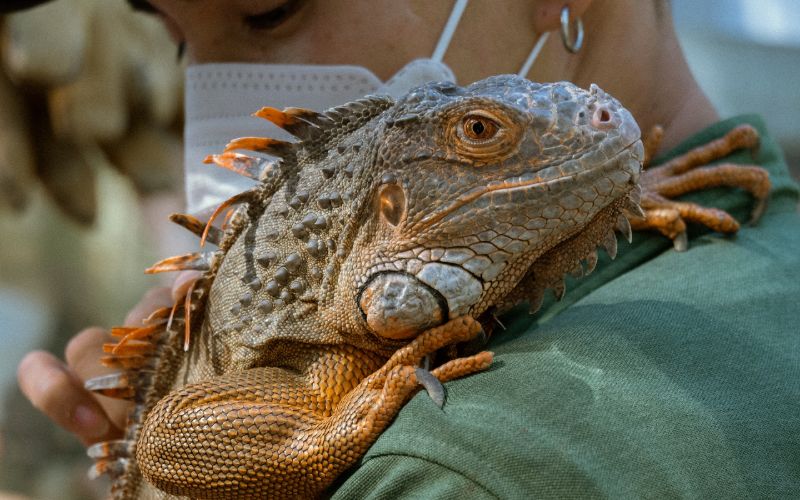
1. Salmonella
Many reptiles carry these bacteria, which can be on things in their enclosures, in their water, and on their skin. Iguanas also carry Salmonella, but this doesn’t mean you can never touch them.
Clean and disinfect your iguana’s habitat as often as possible. Any time you touch your iguana, wash your hands immediately afterward with soap and water. Practice good hygiene, and keep your iguana’s habitat clean to reduce the risk of contamination.
2. Scratches
Iguanas have long, sharp claws that make them efficient climbers. When they are trying to make a quick getaway or feel like they have to fight in self-defense, scratching is a method that they resort to. While scratches may not cause as much damage as bites, they can still be dangerous due to the bacteria on the iguana’s claws. If you’re scratched, wash the area with soap and water. Keep the wound clean. Use antibacterial ointment if necessary.
To avoid scratches, you can trim your iguana’s claws. This may take practice and is something that your iguana may have to get used to, but with repetition, they can learn to accept it. They may even come to like it, depending on how much your iguana likes being handled.
3. Tail Whipping
Iguanas can grow to be 5 feet long, which means they have long tails. The tail is strong and large and is used as a method of defense when the lizard feels threatened. They will whip their tail into the threat in an attempt to flee.
Tail whips occur when the iguana is feeling aggressive. The signs that this is about to happen are the same as the warning signs for biting. If you see these behaviors, back off to avoid getting whipped.

Reasons for Iguana Aggression
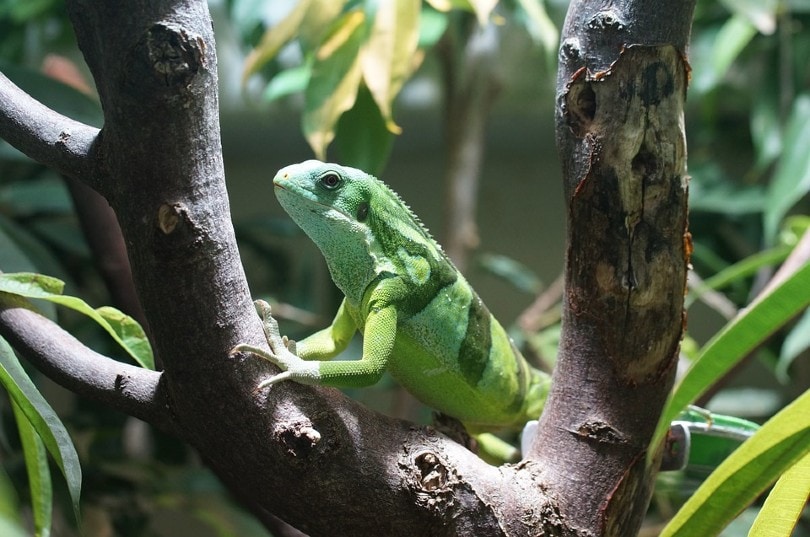
Humans don’t always fully understand iguana instincts. We have to rely on monitoring their body language to see how they’re feeling. There are times when iguanas tend to be more aggressive than normal, and being aware of these times will help you avoid further agitating your lizard.
- Territorial: Your iguana doesn’t want you reaching into their enclosure right now.
- Dominance: Male iguanas can try to exert dominance, especially in the presence of a female iguana.
- Hormones: Hormonal changes as your iguana matures may be responsible for moodiness.
- Breeding season: Iguanas have specific breeding seasons and are known to become more aggressive during these times.

Conclusion
Iguanas can be dangerous in certain situations. Overall, though, they make relaxed and friendly pets that rarely bite or attack without reason.
By familiarizing yourself with your iguana’s body language and personality, you will see the signs that your lizard is feeling agitated and know to leave them be. You can keep yourself and your iguana safe by respecting their boundaries and understanding how they operate.
- You may also be interested in: Do Iguanas Change Color?
Featured Image Credit: islavicek, Shutterstock
